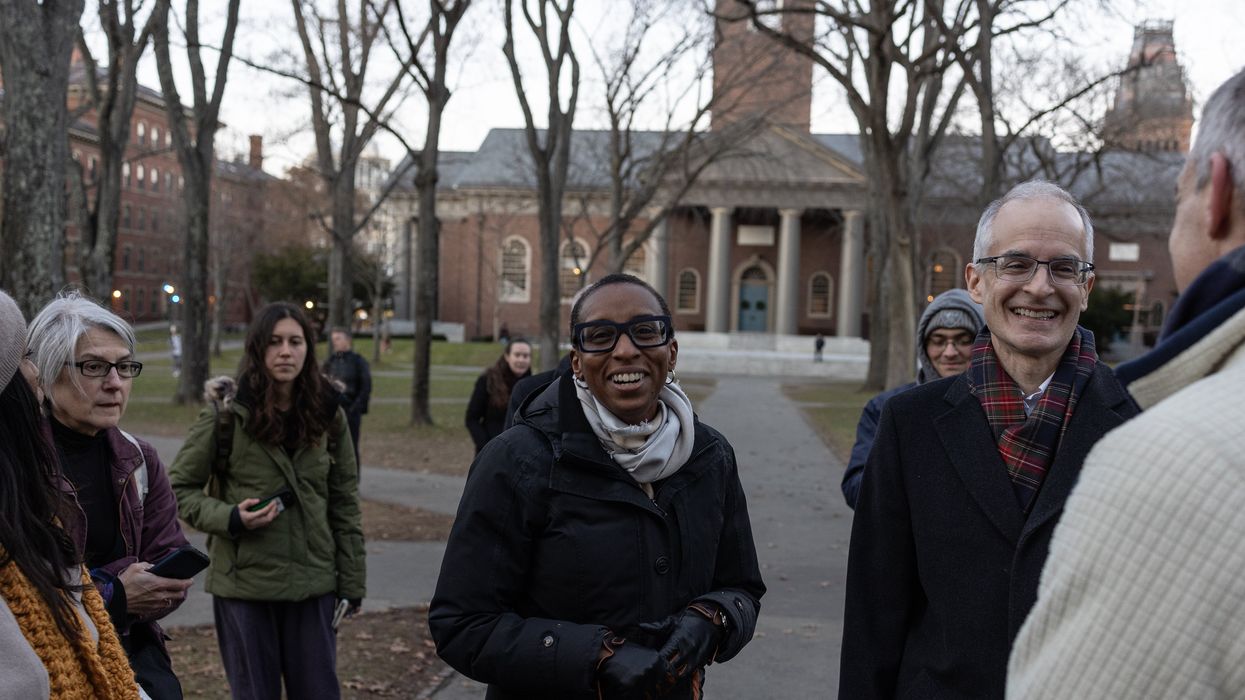Rikleen is the executive director of Lawyers Defending American Democracy and the editor of “ Her Honor – Stories of Challenge and Triumph from Women Judges.” For 10 years, she served as a trustee at Clark University in Worcester, Massachusetts.
The resignations of two Ivy League presidents – Claudine Gay of Harvard and Elizabeth Magill of the University of Pennsylvania – demonstrate the peril facing university leaders who lean into old models that no longer work. Free speech as a revered tenet of higher education cannot demand silence in this all-hands-on-deck moment in history. Universities today have a duty to address increased manifestations of bias, growing threats to democracy and the erosion of individual rights.
Our country is under siege from behaviors and public rhetoric that would have been unfathomable a decade ago. Excessive vitriol and political lies have desensitized the nation, allowing the flourishing of a pernicious campaign to gaslight organizations into silence. In the resulting quiet, mimicry has become the sincerest form of flattery.
Too often, campuses hide behind concepts of free speech and academic freedom to condone their own silence and avoid entering the fray of modern discourse. Universities seeking to respond with a moral compass fear being dismissed as “woke,” and administrators that speak out face the wrath of political leaders and their supporters who are willing to take down every opponent who disagrees.
But the country today desperately needs the moral clarity that an institution of higher education can offer. Studied silence cannot work in these troubled times.
Universities have risen to the occasion previously, so we know they can shift in times of need. Consider the unifying moment when campus leadership rightly stood up to condemn the cold-blooded murder of George Floyd at the hands of a Minneapolis police officer, abetted by his colleagues. Universities around the country immediately condemned the systemic racial injustice and police brutality that led to Floyd’s death, and committed to change their culture and focus on ways to alleviate racism.
For example, at Furman University in South Carolina, the school conducted a racial equity audit, promised to increase Black student enrollment and Black faculty hires, and instituted a zero-tolerance policy in response to racism and discrimination. Brown University called on its campus community to “act against racism and police brutality,” and matched that call with resources, research, programs and projects to address systemic racism. Student groups, including sororities and fraternities, also expressed a commitment to anti-racist and inclusive behaviors.
In the years since, however, higher ed’s focus on anti-racist policies and practices to address the impact of historic systemic racism have faded in intensity. Instead, educators at all levels face hostility and backlash against DEI initiatives, a whitewashing of American history and attacks on a teaching methodology called “critical race theory” that became a derogatory pseudonym for any conversation about race in a classroom.
Governors and legislators have brought this fight directly to colleges and universities, using the budgeting process as a cudgel. In one of the more extreme examples, Florida Gov. Ron DeSantis successfully undertook a hostile takeover of New College, a top-ranked liberal arts college, turning a bastion of inclusion and civility into an unrecognizable campus that abolished DEI efforts, eliminated its gender studies program, fired faculty and replaced administrative leaders. Students and professors have fled the school for other colleges and its ranking has plummeted.
The Oct. 7, 2023, terrorist attack perpetrated by Hamas, an organization devoted to the elimination of Israel, was so brutal in its execution that it should have elicited clear condemnation from university leaders throughout the country. Instead, as some student groups defended Hamas and antisemitic incidents increased, universities grappled with how they should publicly respond to the terrorism and kidnappings, as well as how to keep their campuses secure.
This was soon followed by a show-trial congressional hearing in which three female presidents of the nation’s top universities provided overly legalistic responses to the trap set by the House Education and the Workforce Committee. The presidents gave tortured responses to simplistic questions, walking directly into the minefield that exploded with their efforts to address their concomitant obligations to protect free expression.
But freedom of expression should not prevent a university from speaking with unequivocal clarity in matters of moral imperative. An institution should be capable of speaking as a governing and leadership body, while promoting and protecting the free expression of ideas among students and faculty.
Indeed, the highest calling of higher education should be the ability to both model courageous behavior and encourage civil discourse in ways that can serve as conflict-resolution lessons throughout life.
Universities are essential to a thriving democracy. They have the privilege of teaching lessons to generations of students that will guide them throughout their lives. With that privilege comes the obligation to confront their moral obligation to speak in times of crisis, and then infuse their campuses with opportunities for civil dialogue to address the passions and perspectives that will emerge.
In these difficult times, with so much at risk, there is no such thing as principled silence. There is, however, the opportunity for academic institutions to demonstrate leadership and learning lessons that can have far-reaching implications beyond what takes place in the classroom.




















Eric Trump, the newly appointed ALT5 board director of World Liberty Financial, walks outside of the NASDAQ in Times Square as they mark the $1.5- billion partnership between World Liberty Financial and ALT5 Sigma with the ringing of the NASDAQ opening bell, on Aug. 13, 2025, in New York City.
Why does the Trump family always get a pass?
Deputy Attorney General Todd Blanche joined ABC’s “This Week” on Sunday to defend or explain a lot of controversies for the Trump administration: the Epstein files release, the events in Minneapolis, etc. He was also asked about possible conflicts of interest between President Trump’s family business and his job. Specifically, Blanche was asked about a very sketchy deal Trump’s son Eric signed with the UAE’s national security adviser, Sheikh Tahnoon.
Shortly before Trump was inaugurated in early 2025, Tahnoon invested $500 million in the Trump-owned World Liberty, a then newly launched cryptocurrency outfit. A few months later, UAE was granted permission to purchase sensitive American AI chips. According to the Wall Street Journal, which broke the story, “the deal marks something unprecedented in American politics: a foreign government official taking a major ownership stake in an incoming U.S. president’s company.”
“How do you respond to those who say this is a serious conflict of interest?” ABC host George Stephanopoulos asked.
“I love it when these papers talk about something being unprecedented or never happening before,” Blanche replied, “as if the Biden family and the Biden administration didn’t do exactly the same thing, and they were just in office.”
Blanche went on to boast about how the president is utterly transparent regarding his questionable business practices: “I don’t have a comment on it beyond Trump has been completely transparent when his family travels for business reasons. They don’t do so in secret. We don’t learn about it when we find a laptop a few years later. We learn about it when it’s happening.”
Sadly, Stephanopoulos didn’t offer the obvious response, which may have gone something like this: “OK, but the president and countless leading Republicans insisted that President Biden was the head of what they dubbed ‘the Biden Crime family’ and insisted his business dealings were corrupt, and indeed that his corruption merited impeachment. So how is being ‘transparent’ about similar corruption a defense?”
Now, I should be clear that I do think the Biden family’s business dealings were corrupt, whether or not laws were broken. Others disagree. I also think Trump’s business dealings appear to be worse in many ways than even what Biden was alleged to have done. But none of that is relevant. The standard set by Trump and Republicans is the relevant political standard, and by the deputy attorney general’s own account, the Trump administration is doing “exactly the same thing,” just more openly.
Since when is being more transparent about wrongdoing a defense? Try telling a cop or judge, “Yes, I robbed that bank. I’ve been completely transparent about that. So, what’s the big deal?”
This is just a small example of the broader dysfunction in the way we talk about politics.
Americans have a special hatred for hypocrisy. I think it goes back to the founding era. As Alexis de Tocqueville observed in “Democracy In America,” the old world had a different way of dealing with the moral shortcomings of leaders. Rank had its privileges. Nobles, never mind kings, were entitled to behave in ways that were forbidden to the little people.
In America, titles of nobility were banned in the Constitution and in our democratic culture. In a society built on notions of equality (the obvious exceptions of Black people, women, Native Americans notwithstanding) no one has access to special carve-outs or exemptions as to what is right and wrong. Claiming them, particularly in secret, feels like a betrayal against the whole idea of equality.
The problem in the modern era is that elites — of all ideological stripes — have violated that bargain. The result isn’t that we’ve abandoned any notion of right and wrong. Instead, by elevating hypocrisy to the greatest of sins, we end up weaponizing the principles, using them as a cudgel against the other side but not against our own.
Pick an issue: violent rhetoric by politicians, sexual misconduct, corruption and so on. With every revelation, almost immediately the debate becomes a riot of whataboutism. Team A says that Team B has no right to criticize because they did the same thing. Team B points out that Team A has switched positions. Everyone has a point. And everyone is missing the point.
Sure, hypocrisy is a moral failing, and partisan inconsistency is an intellectual one. But neither changes the objective facts. This is something you’re supposed to learn as a child: It doesn’t matter what everyone else is doing or saying, wrong is wrong. It’s also something lawyers like Mr. Blanche are supposed to know. Telling a judge that the hypocrisy of the prosecutor — or your client’s transparency — means your client did nothing wrong would earn you nothing but a laugh.
Jonah Goldberg is editor-in-chief of The Dispatch and the host of The Remnant podcast. His Twitter handle is @JonahDispatch.